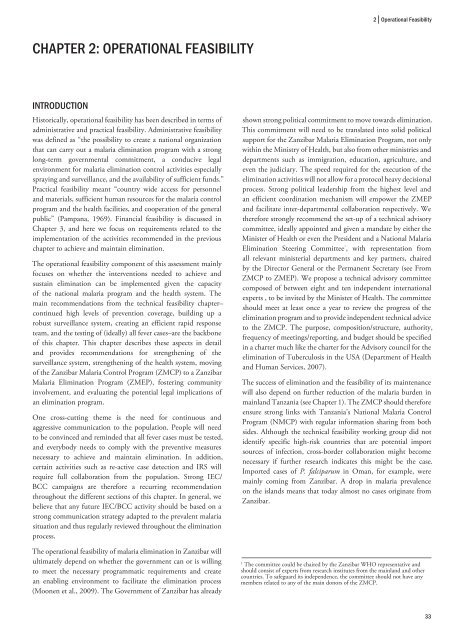MALARIA ELIMINATION IN ZANZIBAR - Soper Strategies
MALARIA ELIMINATION IN ZANZIBAR - Soper Strategies
MALARIA ELIMINATION IN ZANZIBAR - Soper Strategies
You also want an ePaper? Increase the reach of your titles
YUMPU automatically turns print PDFs into web optimized ePapers that Google loves.
CHAPTER 2: OPERATIONAL FEASIBILITY<br />
<strong>IN</strong>TRODUCTION<br />
Historically, operational feasibility has been described in terms of<br />
administrative and practical feasibility. Administrative feasibility<br />
was defined as “the possibility to create a national organization<br />
that can carry out a malaria elimination program with a strong<br />
long-term governmental commitment, a conducive legal<br />
environment for malaria elimination control activities especially<br />
spraying and surveillance, and the availability of sufficient funds.”<br />
Practical feasibility meant “country wide access for personnel<br />
and materials, sufficient human resources for the malaria control<br />
program and the health facilities, and cooperation of the general<br />
public” (Pampana, 1969). Financial feasibility is discussed in<br />
Chapter 3, and here we focus on requirements related to the<br />
implementation of the activities recommended in the previous<br />
chapter to achieve and maintain elimination.<br />
The operational feasibility component of this assessment mainly<br />
focuses on whether the interventions needed to achieve and<br />
sustain elimination can be implemented given the capacity<br />
of the national malaria program and the health system. The<br />
main recommendations from the technical feasibility chapter–<br />
continued high levels of prevention coverage, building up a<br />
robust surveillance system, creating an efficient rapid response<br />
team, and the testing of (ideally) all fever cases–are the backbone<br />
of this chapter. This chapter describes these aspects in detail<br />
and provides recommendations for strengthening of the<br />
surveillance system, strengthening of the health system, moving<br />
of the Zanzibar Malaria Control Program (ZMCP) to a Zanzibar<br />
Malaria Elimination Program (ZMEP), fostering community<br />
involvement, and evaluating the potential legal implications of<br />
an elimination program.<br />
One cross-cutting theme is the need for continuous and<br />
aggressive communication to the population. People will need<br />
to be convinced and reminded that all fever cases must be tested,<br />
and everybody needs to comply with the preventive measures<br />
necessary to achieve and maintain elimination. In addition,<br />
certain activities such as re-active case detection and IRS will<br />
require full collaboration from the population. Strong IEC/<br />
BCC campaigns are therefore a recurring recommendation<br />
throughout the different sections of this chapter. In general, we<br />
believe that any future IEC/BCC activity should be based on a<br />
strong communication strategy adapted to the prevalent malaria<br />
situation and thus regularly reviewed throughout the elimination<br />
process.<br />
The operational feasibility of malaria elimination in Zanzibar will<br />
ultimately depend on whether the government can or is willing<br />
to meet the necessary programmatic requirements and create<br />
an enabling environment to facilitate the elimination process<br />
(Moonen et al., 2009). The Government of Zanzibar has already<br />
2 | Operational Feasibility<br />
shown strong political commitment to move towards elimination.<br />
This commitment will need to be translated into solid political<br />
support for the Zanzibar Malaria Elimination Program, not only<br />
within the Ministry of Health, but also from other ministries and<br />
departments such as immigration, education, agriculture, and<br />
even the judiciary. The speed required for the execution of the<br />
elimination activities will not allow for a protocol heavy decisional<br />
process. Strong political leadership from the highest level and<br />
an efficient coordination mechanism will empower the ZMEP<br />
and facilitate inter-departmental collaboration respectively. We<br />
therefore strongly recommend the set-up of a technical advisory<br />
committee, ideally appointed and given a mandate by either the<br />
Minister of Health or even the President and a National Malaria<br />
Elimination Steering Committee 1 , with representation from<br />
all relevant ministerial departments and key partners, chaired<br />
by the Director General or the Permanent Secretary (see From<br />
ZMCP to ZMEP). We propose a technical advisory committee<br />
composed of between eight and ten independent international<br />
experts , to be invited by the Minister of Health. The committee<br />
should meet at least once a year to review the progress of the<br />
elimination program and to provide independent technical advice<br />
to the ZMCP. The purpose, composition/structure, authority,<br />
frequency of meetings/reporting, and budget should be specified<br />
in a charter much like the charter for the Advisory council for the<br />
elimination of Tuberculosis in the USA (Department of Health<br />
and Human Services, 2007).<br />
The success of elimination and the feasibility of its maintenance<br />
will also depend on further reduction of the malaria burden in<br />
mainland Tanzania (see Chapter 1). The ZMCP should therefore<br />
ensure strong links with Tanzania’s National Malaria Control<br />
Program (NMCP) with regular information sharing from both<br />
sides. Although the technical feasibility working group did not<br />
identify specific high-risk countries that are potential import<br />
sources of infection, cross-border collaboration might become<br />
necessary if further research indicates this might be the case.<br />
Imported cases of P. falciparum in Oman, for example, were<br />
mainly coming from Zanzibar. A drop in malaria prevalence<br />
on the islands means that today almost no cases originate from<br />
Zanzibar.<br />
1 The committee could be chaired by the Zanzibar WHO representative and<br />
should consist of experts from research institutes from the mainland and other<br />
countries. To safeguard its independence, the committee should not have any<br />
members related to any of the main donors of the ZMCP.<br />
33


